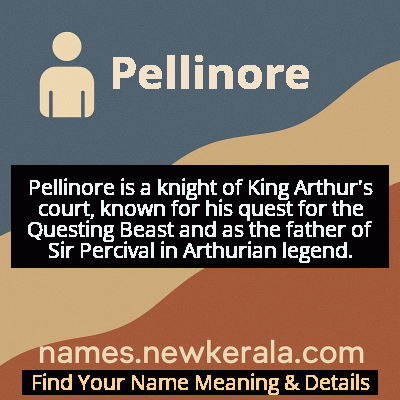Pellinore Name Meaning & Details
Origin, Popularity, Numerology Analysis & Name Meaning of Pellinore
Discover the origin, meaning, and cultural significance of the name PELLINORE. Delve into its historical roots and explore the lasting impact it has had on communities and traditions.
Name
Pellinore
Gender
Male
Origin
Arthurian
Lucky Number
7
Meaning of the Name - Pellinore
Pellinore is a knight of King Arthur's court, known for his quest for the Questing Beast and as the father of Sir Percival in Arthurian legend.
Pellinore - Complete Numerology Analysis
Your Numerology Number
Based on Pythagorean Numerology System
Ruling Planet
Neptune (Ketu)
Positive Nature
Intuitive, analytical, spiritual, and inquisitive.
Negative Traits
Secretive, reserved, aloof, and can be overly critical.
Lucky Colours
Green, yellow.
Lucky Days
Monday.
Lucky Stones
Cat’s eye, moonstone.
Harmony Numbers
1, 5, 6.
Best Suited Professions
Scientists, researchers, spiritual leaders, detectives.
What People Like About You
Depth of knowledge, analytical skills, spirituality.
Famous People Named Pellinore
King Pellinore
Arthurian Monarch
Legendary king known for hunting the Questing Beast and father of Sir Percival
Pellinore (Malory character)
Literary Knight
Central figure in the Arthurian blood feud that contributes to Camelot's downfall
Pellinore (White adaptation)
Fictional Character
Memorable portrayal as the eccentric but noble hunter in 'The Once and Future King'
Name Variations & International Equivalents
Click on blue names to explore their detailed meanings. Gray names with will be available soon.
Cultural & Historical Significance
His cultural impact extends beyond his role as a knight to his function as a tragic figure whose personal story illustrates the fragility of Arthur's political project. The feud between Pellinore's family and the Orkney clan, beginning with his killing of King Lot, creates one of the central conflicts that ultimately undermines Camelot's unity. This narrative thread explores themes of honor, vengeance, and the inescapable nature of blood debts in medieval society. Pellinore's legacy is further complicated by his son Percival's achievement as a Grail knight, creating a dynastic narrative that spans both the political and spiritual dimensions of Arthurian legend. Through these interconnected roles, Pellinore represents the complex web of relationships, obligations, and conflicts that define the Arthurian world.
Extended Personality Analysis
Pellinore's personality represents a fascinating blend of noble dedication and human fallibility that makes him one of Arthurian legend's most psychologically complex characters. His defining trait is his obsessive pursuit of the Questing Beast, which demonstrates extraordinary perseverance and commitment to his sworn duty. This quality shows him as a man of profound dedication, willing to sacrifice comfort, stability, and even his royal responsibilities for what he perceives as his destiny. However, this same obsession reveals a potential character flaw—the inability to balance different aspects of life and the tendency to become consumed by a single purpose.
Beyond his quest-oriented nature, Pellinore displays significant emotional depth and relational complexity. His role as father to Percival and other children shows his capacity for tenderness and familial devotion, particularly after his wife's death. His integration into Arthur's court demonstrates adaptability and loyalty, while his tragic involvement in the feud with the Orkney clan reveals how good intentions can lead to catastrophic consequences through momentary lapses in judgment. This combination of noble qualities and very human weaknesses makes Pellinore a remarkably relatable figure—a good man whose virtues are inseparable from his flaws, and whose story serves as a poignant reminder of how even the most dedicated individuals can become entangled in cycles of violence and tragedy.
Modern Usage & Popularity
In contemporary naming practices, Pellinore remains an exceptionally rare choice, primarily confined to literary and Arthurian enthusiast circles. The name's complexity, distinctive sound, and strong association with a specific mythological character limit its widespread adoption. However, it enjoys periodic revivals in fantasy literature, role-playing games, and Arthurian-themed media, where its authentic medieval roots give it credibility. Modern usage trends show that Pellinore appears occasionally as a character name in fantasy novels and video games, though it rarely transitions to real-world naming. The name's length and unusual sound make it challenging for everyday use, though it sometimes appears as a middle name in families with Arthurian interests or as a distinctive choice for pets in households fond of literary names. Its continued presence in new adaptations of Arthurian legends ensures that the name remains in cultural memory, even if it doesn't achieve mainstream popularity.
Symbolic & Spiritual Meanings
Pellinore serves as a powerful symbol of the eternal quest and the human condition of being defined by one's pursuits. His endless hunt for the Questing Beast represents the metaphysical search for meaning and purpose that transcends practical concerns. This makes him an emblem of dedication, obsession, and the noble futility that often characterizes human endeavors. The cyclical nature of his pursuit—always chasing but never capturing—mirrors the Sisyphean aspects of existence and the human tendency to become defined by our struggles rather than our achievements.
Metaphorically, Pellinore embodies the archetype of the hunter in both literal and psychological dimensions. He represents the pursuit of elusive goals, whether they be personal fulfillment, spiritual enlightenment, or abstract ideals. His story serves as a cautionary narrative about the dangers of single-minded obsession and how noble pursuits can sometimes lead to the neglect of other important aspects of life. The Questing Beast itself symbolizes the unattainable—those goals that remain just beyond reach, driving us forward while simultaneously ensuring we never arrive. Through this symbolic framework, Pellinore becomes a representation of both the nobility and potential tragedy of human aspiration, making him a timeless figure whose story continues to resonate with modern audiences facing their own 'questing beasts' in various forms.

